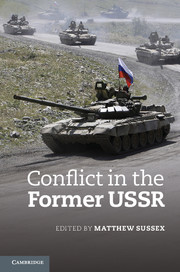Book contents
- Frontmatter
- Contents
- Maps
- Contributors
- Acknowledgements
- Abbreviations
- Map
- 1 Introduction
- 2 The return of imperial Russia
- 3 The shape of the security order in the former USSR
- 4 Great powers and small wars in the Caucasus
- 5 The Russo-Georgian war
- 6 Why not more conflict in the former USSR?
- 7 Transnational crime, corruption and conflict in Russia and the former USSR
- 8 The transformation of war?
- 9 Conclusions
- Bibliography
- Index
4 - Great powers and small wars in the Caucasus
Published online by Cambridge University Press: 05 November 2012
- Frontmatter
- Contents
- Maps
- Contributors
- Acknowledgements
- Abbreviations
- Map
- 1 Introduction
- 2 The return of imperial Russia
- 3 The shape of the security order in the former USSR
- 4 Great powers and small wars in the Caucasus
- 5 The Russo-Georgian war
- 6 Why not more conflict in the former USSR?
- 7 Transnational crime, corruption and conflict in Russia and the former USSR
- 8 The transformation of war?
- 9 Conclusions
- Bibliography
- Index
Summary
In this chapter I outline a model for understanding Russian and international politics against the background of conflicts in the Caucasus, beginning with Russia’s internal wars in Chechnya and culminating in the interstate five-day Russo-Georgian war. Both conflicts exposed an impasse at the global and regional levels, and reflected the fact that the international political order established after the disintegration of the Soviet bloc between 1989 and 1991 had failed to deliver a viable and inclusive international system of security and development. This has been most apparent in the Caucasus, which has become the epicentre of a new series of confrontations.
As I argue in this chapter, two of these confrontations are crucial. The first is the clash between two principles of authority within the Russian state itself: between the prerogative and the constitutional state. The war in Chechnya, the longest and arguably the most bitter conflict on the territory of the former USSR, has now ended in some sort of resolution based on a despotic regime in a clientelistic relationship with Moscow, entrenching the powers of the arbitrary state in the Caucasus, and reinforcing arbitrariness in the Russian political system as a whole. In particular, the Chechen war(s) from 1994 to 2008 intensified the emergence of a Russian ‘dual state’, in which the state as a normative/legal entity increasingly gave way to the prerogative state on issues of vital interest, such as territorial integrity and access to resovurces.
- Type
- Chapter
- Information
- Conflict in the Former USSR , pp. 64 - 90Publisher: Cambridge University PressPrint publication year: 2012



